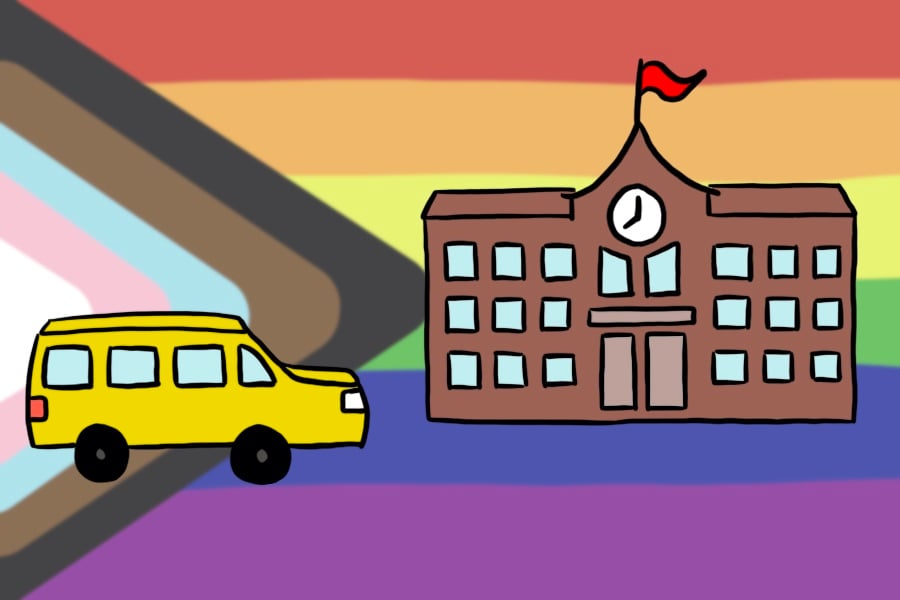Local teachers discuss implementing LGBTQ+ education law
Illustration by Eliana Storkamp
After nearly two years since the passage of the Inclusive Curriculum Law, advocates are still working to ensure it is universally implemented.
May 1, 2022
Before high school, Tanairi Cornwell said their teachers never discussed the LGBTQ+ community in class — an experience they said many incoming freshmen share.
“If we’re going to have this tight community and get our students to be safe in the community, we have to know about why we are the way we are now, and what brought us to this point,” Cornwell said.
Now a junior at Chicago Academy High School, Cornwell said Illinois’ 2019 Inclusive Curriculum Law provides a chance for them and their classmates to learn about LGBTQ+ identities earlier on in their education.
The Inclusive Curriculum Law requires public schools to teach students about LGBTQ+ people’s contributions to state and national history by the time they reach eighth grade. A 2019 survey by the Gay, Lesbian and Straight Education Network suggests this can improve students’ experiences by increasing academic achievement and lowering victimization and absenteeism.
Moaweah Kader, who has taught history at Chicago Academy High School for seven years, said the Inclusive Curriculum Law inspired him to include a two-week unit on LGBTQ+ activism in his curriculum for the first time this spring.
“To really get kids to engage, they need to feel safe and welcomed, and to progress even further, they need to learn more about the past,” Kader said. “You have to build that awareness, and it has to be built deep.”
But nearly two years since the law passed, activists are still working to ensure it is implemented effectively across the state.
Grecia Magdaleno, the policy and advocacy manager for the Illinois Safe Schools Alliance, outlined three main roadblocks in ensuring schools’ compliance with the law. They said the large size of the state, educators’ hesitancy about where to begin and the fact that it is an unfunded mandate are obstacles. School closure due to the pandemic has been an additional hurdle, and Magdaleno emphasized advocacy is essential to pushing implementation forward.
Currently, the Inclusive Curriculum Advisory Council of Illinois is working with school districts on a case-by-case basis, Magdaleno said. According to them, the main problem is not that teachers disagree with the law, but that some don’t know where to begin and may be “afraid of the unknown.”
Mariano Azuela Elementary School teacher Gregory Cooley said he hasn’t significantly changed his eighth grade social studies curriculum, but he plans to restructure his lessons by reviewing professional development resources he’s collected from past years.
“(Students) need to see the teacher as an advocate, not as someone who they want to put up their defenses against,” Cooley said.
In an effort to help teachers tackle curriculum design, the Inclusive Curriculum Advisory Council of Illinois has created free searchable lesson plans, professional development resources and guidance documents related to LGBTQ+ history. Magdaleno said a full implementation guide will be published for the 2022-2023 school year.
Magdaleno added the council is currently building relationships with the state’s Regional Offices of Education with the goal of expanding the distribution of these resources so educators are better aware of available support.
Bill Farmer (Weinberg ’03) is the staff sponsor of the Gender & Sexuality Alliance club at Evanston Township High School, where he has taught science for 19 years. He said the Inclusive Curriculum Law can benefit all students, no matter whether they are part of the LGBTQ+ community.
“Curriculum should provide windows and mirrors: windows into things that you’re not as familiar with, but also mirrors that reflect who you are,” Farmer said.
Opposition among Illinois educators exists as well. As a member of the statewide LGBTQ+ Committee for the Illinois Education Association, Farmer said he has witnessed some school districts flat-out ignore the mandate.
Marla Britton, a former secondary school teacher and current substitute teacher, said she respects her LGBTQ+ students but would be uncomfortable teaching about LGBTQ+ history due to her religious values as a Christian.
“It’s very hard for me to even desire, at times, to work in a public school system anymore because of the rules and regulations set forth that go against my religious belief system,” Britton said.
Illinois is just one of six states to implement a law of this kind, as of June 2021. And some states are moving to do the exact opposite. In March, Florida Gov. Ron DeSantis signed the Parental Rights in Education bill, dubbed the “Don’t Say Gay” law, which bans classroom discussions about sexual orientation and gender identity in Florida’s primary schools.
In 2022 alone, more than 300 anti-LGBTQ+ bills have been introduced in the U.S., many of which target transgender youth, according to the advocacy group Human Rights Campaign.
Kader considers these measures a step in the wrong direction and said fostering acceptance through inclusive education is key.
“People aren’t born with hate in their heart — it’s taught,” Kader said. “So, if we can teach people to be accepting, I feel that’s the best way to progress forward.”
Email: [email protected]
Twitter: @ZMilfred
Related Stories:
— District 65 school board candidates discuss LGBTQ+ inclusive curriculum


